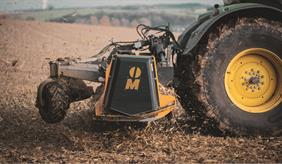10.12.2024

In a recent publication in the journal Discover Soil, scientists from the Leibniz Centre for Agricultural Landscape Research (ZALF) examined the challenges and barriers to the widespread adoption of sustainable soil management in Germany. For the study, 76 farmers were asked about their experiences, opinions and challenges in relation to sustainable soil management methods.
Sustainable soil management includes practices that maintain soil fertility and health without harming the environment. The researchers wanted to analyze factors supporting or hindering the implementation of sustainable soil management practices in conventional and organic farming systems.
The study involved an online survey of 61 conventional and 15 organic farms in ten German states. The results show that widespread adoption of sustainable practices requires targeted support programs and structural changes in agricultural policy. Tailored incentives that meet the specific needs of different farms are particularly important.
Sustainable soil management involves seven key actions
Seven key actions are recommended to promote soil health and the resilience of agricultural soils. These recommendations are based on the results of international research projects such as the EU initiative "A Soil Deal for Europe". Link: www.nks-bio-umw.de
Landscape structure elements such as hedges, grass or flower strips, or buffer zones along water bodies.
Organic fertilization, for example with manure, compost or plant residues
Diverse crop rotations, i.e. alternating crops in a field
Continuous soil cover, such as intercropping and cover crops or mulching
Conservation tillage by avoiding deep plowing and tilling
Reducing soil pressure through lighter machinery or better weight distribution
Optimized driving, e.g. through tramlines, steering systems or driving at times of optimal soil conditions
These practices promote soil biodiversity, increase carbon storage and improve water retention. The farms surveyed largely confirmed the effectiveness of these practices. The study also shows that it is not a lack of knowledge, but rather economic and financial barriers that stand in the way of widespread adoption.
Economic barriers and structural differences
The study shows that conventional and organic farms prefer different practices. For example, conventional farms tend to use conservation tillage, in which the soil is only worked superficially - in these systems, crop protection products can be used to control weeds. Organic farms, on the other hand, tend to use time-optimized tillage, which avoids heavy machinery when the soil is wet to prevent compaction.
"Our results show that economic factors, such as a lack of financial incentives or insufficient policy support, are the key barriers," says study leader
Dr. Mona Aghabeygi of ZALF. These factors have resulted in important soil conservation measures, such as continuous soil cover or the use of organic fertilizers, being less widespread than desired on both organic and conventional farms.
Future Opportunities
The study provides valuable insights for the development of sustainable soil management strategies that can be applied in different agricultural systems. It shows that policy measures can play a crucial role in overcoming existing barriers to promote the transition to more sustainable agriculture. Economic support plays a key role in facilitating the adoption of soil conservation technologies by farmers.
Project partner: Leibniz Centre for Agricultural Landscape Research (ZALF)
Eberswalde University of Sustainable Development (HNEE)
Funding:
This work was funded by the German Federal Ministry of Education and Research (BMBF) in the framework of the funding measure ’Soil as a Sustainable Resource for the Bioeconomy – BonaRes,’ project ’BonaRes Centre for Soil Research’ (Grant 031B1064B).
Text disclaimer:
This is a summary of the original text created with the help of artificial intelligence: Aghabeygi, M., Strauss, V., Paul, C., & Helming, K. Barriers of adopting sustainable soil management practices for organic and conventional farming systems, Discover Soil, 2024, 1:11. DOI: 10.1007/s44378-024-00008-1, published Open Access under the license CC BY 4.0: Link:.
The text has been carefully reviewed and revised in the light of AI regulations at ZALF.
Further Information:
